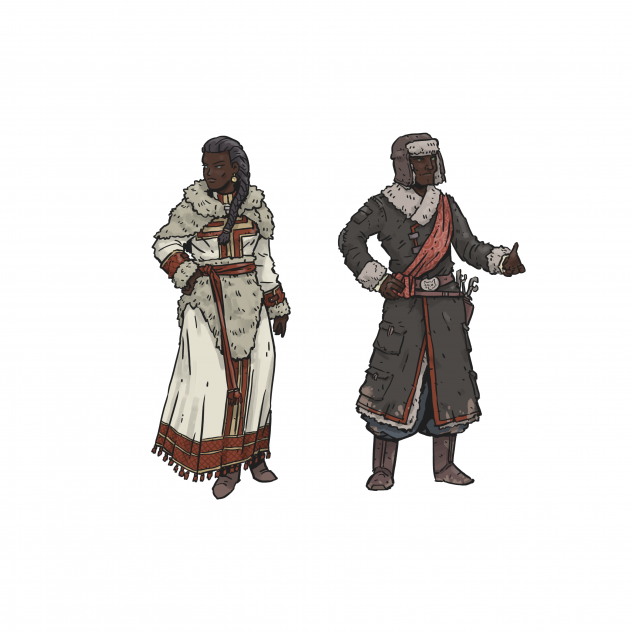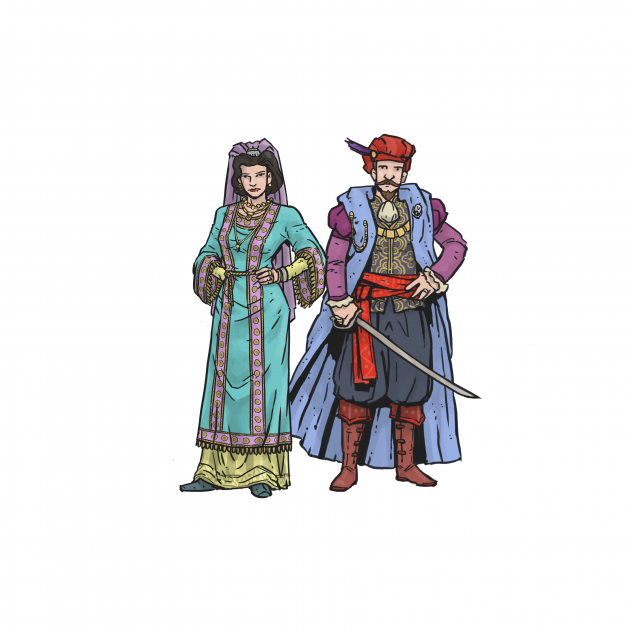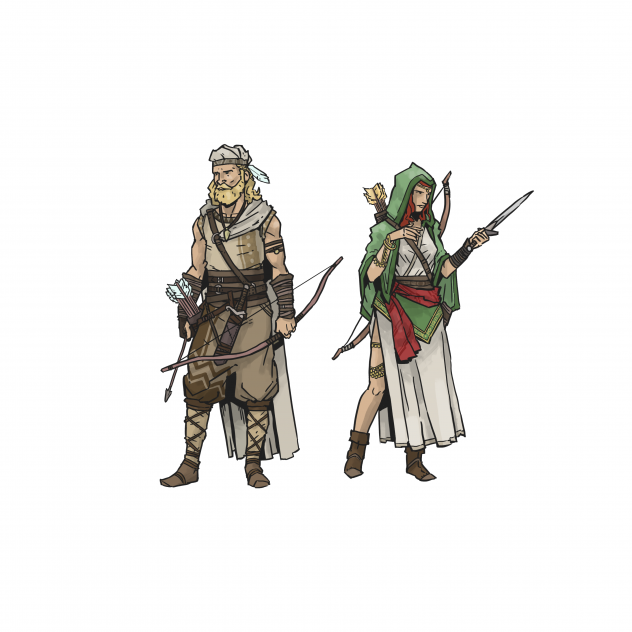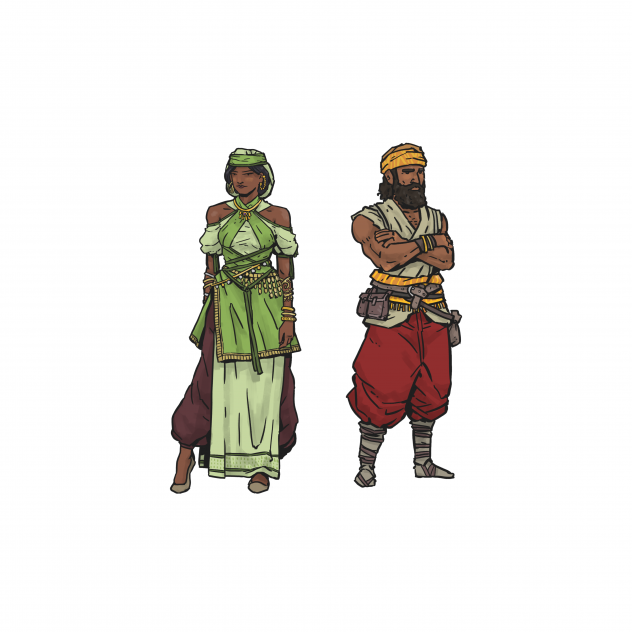TUBORI
FEATURES
The Tubori people hail from the tropical island chain of Tubor, named for its capital of Tubor City. Tubori culture is less lawful and strictly caste-based than the other duchies; while caste divisions are still meaningful, the Tubori people believe that a person is entitled to whatever status or success he or she can manage to grasp. This philosophy leads to both ‘might makes right’ ideals and acceptance of ‘liberal’ policies such as same-sex marriage. However, the family – an extended, tight-knit and hierarchical institution in Tubor – is also critically important. The one limitation the Tubori traditionally accept is the need to put their family’s welfare above their own.
The Tubori people are generally lean and lithely built, tending toward slightly darker complexions than Lithmorrans, Vavardi, or Charali but being noticeably lighter than Vandagans or Fariners; a trend toward naturally olive skin is exacerbated by the tropical sun. Their hair colors range from light brown to deep black, while any eye color from blue to dark brown may be observed. As passionate people in a bountiful land, they have a great love of the outdoors, fighting, dancing and sport.
Average Statistics:
Female: Height 1.63m (5’4″ ft), Weight 52 kg (114 lbs)
Male: Height 1.67m (5’6″ ft), Weight 63 kg (139 lbs)
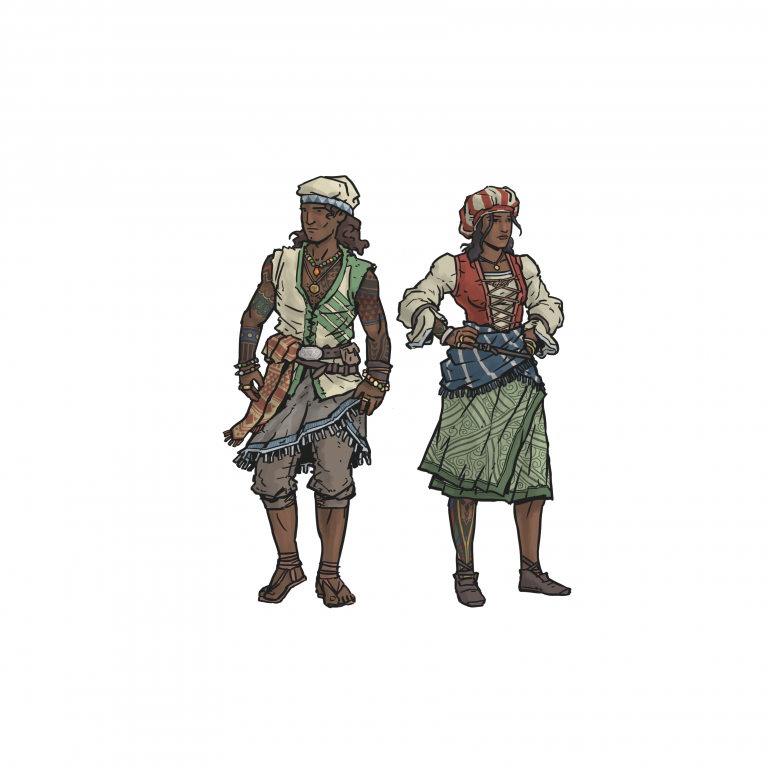
FAITH
Tubori faith is often seen as lax compared to the other duchies. While sins, heresies and magery are handled with similar penances as to those used elsewhere, the Tubori definition of sin is situational – focusing more on the consequences of the act. Tubori also do not judge strangers’ behavior as much as the stricter duchies’ people might, but not due to a more compassionate view of the faith; instead, they often simply don’t care about those outside of their circles. However, Tubori are still genuinely faithful, do not accept open heresy or magery, and vigilantly uphold the sanctity and reputation of their loose extended families.
Charity: Charity is rather rare in Tubor. Priests focus sermons on looking after one’s own rather than strangers, and so those who are not lucky enough to have some personal tie to a wealthy person or group are rarely the recipients of any charity.
Sexuality: Tubor’s attitudes toward sexual sins is commonly thought of as lax, but this is only true in the specific case of premarital sex between individuals with an affirmed bond. As the Tubori value love, adultery is actually punished more fiercely than in several other duchies, and immorality with many partners is seen as critically irresponsible to potential children. The Tubori do accept same-sex marriages freely, but hold them to the same standard: sexual behavior is only acceptable in the confines of serious, committed monogamous relationships.
Magery/Heresy: Witchcraft and heresy are as real threats on the isles as anywhere else – perhaps worse, given the Tubori people’s tendency to stay out of others’ business. By the time a witch is caught, it’s often only after they’ve managed to do something fairly obvious. That said, witchcraft or heresy within a family is seen as the ultimate shame, and it is extremely common for individuals to be turned in by their own family members to cleanse the blight on the family’s righteousness. Unrepentant heretics have a way of simply disappearing.
FASHION
Tubori fashion is a curious blend of traditional islander wear and Lithmorran influence. The traditional Tubori costume consists of a knee-length wrap skirt (for both men and women) cut of very light fabrics in bright, airy colors and often pleated, along with either a bare chest or an abbreviated gauzy sleeveless blouse that bares the midriff and lace-up sandals. It’s common for the elements of this dress to be convertible – crafted sheets of light fabric that can be rearranged in different fashions, or quickly removed in the heat. The skirt is typically secured by a long, narrow fringed scarf tied about the waist in complex patterns, ends hanging freely for formal occasions but tied up in day-to-day wear.
Common Dress: Commoners often work shirtless, with women binding their breasts for practicality’s sake if their physique demands it. Their jewelry (bracelets, rings, necklaces, armlets, earrings and anklets, worn freely by either gender) is usually crafted from shells, coral, and glass beads. Sailors wear a more rugged sort of garb: loose breeches, heavy boots, and poet-style shirts (with or without sleeves). This style has spilled over into land-bound wear as well, though skirts and draped tops remain more common.
Upper-Class Dress: Gentry and nobility garb themselves in similar ways, but add refinement and complexity. Extra layers of drapery intricately folded, pleated, and secured by jeweled brooches adorn otherwise bare shoulders or simple skirts – the rich often try to outdo each other by adding more fabric while still displaying skin and avoiding heat stroke. Silk often replaces linen and cotton, particularly light Vavardi silk. The richest of the rich wear the ultra-fine, whisper-thin golden fabric known as ‘sea silk’, harvested from mollusks that live in Lightwater Bay. Jewelry incorporates precious metals and native Tubori pearls. Due to Lithmorran influence, a specific type of gown-like tunic has become common upper-class wear across both genders; this tunic is sleeveless, high-collared, and closely fit down to a side-split skirt, under which blousy pantaloons are worn.
Tattoos: The Tubori, like the Hillmen, are prone to tattooing to distinguish social affiliations and life stories. More powerful families often use tattooing with the family crest as a way to mark their members. Noble tattoos tend to be of far higher quality and larger pieces on the back, easily hidden by Lithmorran clothing. Tubori rarely tattoo their faces, as this is a common place for slaves to be marked with sigils indicating their trade, but all other parts of the body are game.
TRADE
Trade is the lifeblood of Tubor, especially as it moves primarily in one direction; the Tubori have a tremendous amount of unusual resources to export, and import very little, taking pride in their self-sufficiency as a country. Moreover, the seafaring skill of the Tubori renders them very much in demand for both shipping and smuggling cargo to different areas of the Kingdom. Rumors even suggest that the Tubori dare the dangerous Levusto Strait to trade with the Daravi. Of course, with such seafaring daring, piracy is a genuine issue; Tubori pirates raid the Dralth, the Kirulean, and sometimes even the Kingdom’s rivers and canals.
Many of Tubor’s exports come from its sheer variety of flora: citrus, other rare fruits such as pineapples and mangos, expensive spices such as vanilla, ginger, and cacao, and of course the rare and expensive sweet wines made from grapes that grow only in Tubor’s mountainous regions.
The sea also provides tremendous bounty in the form of unusual fish and shellfish, mollusks that produce the famed Tubori purple’ dye and sea silk, pearls both black and white, extremely high-quality glass courtesy of the fine sands, and a wide array of other exports difficult to obtain anywhere else in the entire Kingdom.
The Tubori trade most heavily with the Vavardi, though Vandago and Lithmore are also trade partners; the sumptuous products of the isles, however, hold special appeal for the wealthy and novelty-seeking Vavardi. What importing they do engage in is largely from Vandago, however; ice is a valuable commodity for the wealthy in Tubor, both to ship out their own produce and to provide refreshments in the hot summer months. Both Vandago and Tubor tend to slap high tariffs on their trade with each other despite its necessity, courtesy of old feuds between them.
FOOD
Tubori food is bewildering to outsiders, cooked almost entirely from local ingredients that are often combined in ways other duchies find unappetizing at best. Blends of sweet and savory are very common, as are meals that involve multiple small dishes – and meals that later combine those multiple small dishes into adventurous stews.
Ingredients: Seafood dominates most meat courses, followed by pork and chicken to a lesser extent. Avocados and tomatoes are common, but served alongside seaweed salads and root vegetables. Citrus, bananas, mangos, pineapples, and papayas are only some of Tubor’s wide variety of fruits, matched well with spices like ginger, cacao, vanilla, and coamjar.
Meals: The Tubori eat a light breakfast of simple fish and fruit salads to fight the heat, a heavier lunch just before their midday nap that’s oft a stew cooked from the previous night’s dinner leftovers, and a late, large dinner of many courses that likely includes seafood or pork, root vegetables and seaweed salads, and fruit relishes. Dessert is eaten even in poorer households, due to the easy availability of dessert-appropriate ingredients.
Drinks: The Tubori drink heavily of wines (both grape and cheaper fruit wines), rum, grog, coconut milk, and fresh fruit juices. Salt tea, or brackish water made drinkable with a robust tea leaf native to the isles, is common among the poor.
CUSTOMS
Connections: As a communal people, Tubori define themselves by their social networks. Family is a sacred concept to the Tubori, encompassing not just parents, siblings, and children but also cousins and even close friends. Tubori are raised to think about fulfilling their duties to the family first and foremost, even before following their own heart.
Feasts: Tubori throw communal meals for their extended families at very little prompting. Feasts involve dancing and music, long yarns of epic and probably semi-concocted proportions, usually all sorts of games that test courage and physical prowess, and ample quantities of food. A huge pig is usually spit-roasted, alongside multiple smaller dishes.
The Respite: Given the heat of Tubor, all those except the hardest-pressed workers take the Respite: a nap of an hour or two through the hottest time of the day. The Tubori believe that a siesta improves focus and productivity and is a requirement for a civilized lifestyle.
Slavery: Slavery is an important part of the Tubori lifestyle, especially on the great farms that occupy much of the outlying islands. Farming gentlefolk and nobles often reckon their wealth in slaves. Tubori view this custom pragmatically, as befits their might-makes-right philosophy: if an individual isn’t meant to be a slave, they’ll find a way to throw off their chains. Slaves are usually extremely poor Tubori seized by force or impressed into service to cover impossible debt, though shipments of Charali slaves occasionally come from Vandago.
Seafaring: The Tubori who has little experience with the sea is rare. No part of Tubor is genuinely ‘inland’, and as such, most all Tubori can swim and handle small watercraft. Seafaring habits thus influence every aspect of Tubori culture: terminology, sports and games, clothing, and even food preparation.
MORALS
Duty to one’s family comes first; strangers are owed nothing. Tubori believe that one’s true moral duty is not to abstract laws or rules, but to the family: a collection of relatives both extended and immediate and very close friends, sometimes explicitly adopted by blood pact. The protection and care of one’s family is paramount, and those outside of the family are comparatively unimportant. This is why Tubori do not tend to judge strangers or meddle in others’ business; they have no stake in others’ lives or fates. Tubori are expected to strike a compromise between living an authentic, passionate life and one that contributes to the family in some fashion – mastering this struggle, in fact, is seen as an important part of reaching adulthood. Unsurprisingly, charity is not a particular moral virtue for the Tubori.
Law is not the arbiter of right and wrong. The Tubori focus on family comes with a darker edge; violating the law is acceptable if, for example, it preserves the family. The most extreme and ruthless members of Tubori society may simply make those who threaten them disappear in the night. Note that family’, in this sense, does not refer to individuals but the family as a concept, a whole entity – this is why heresy and magery are not tolerated in family members, because they tarnish the family as a whole.
One must strive wholeheartedly for one’s goals. Tubori society does not suit the lukewarm; it calls for utter devotion. Once one is determined on a course, there is no virtue in holding back. This is one reason why the concept of honor isn’t given much weight in Tubor; one always plays the game to the utmost of one’s ability, and to voluntarily do less is nonsensical. Tubori folk heroes are typically tricksters, roguish characters who outwit as well as outfight their enemies to win glory and the heart of their intended.
Might makes right. Given this belief that people must fight for what they want, Tubori society sees people’s positions in life as an indicator of their capabilities. Tubori typically reason that those who are fit for a higher station will find one via guile or through forging beneficial connections, and if they cannot improve their lot, then they deserve their privation. Those who are on the losing sides of battles for power and position are viewed very unsympathetically, no matter what means their enemies used to defeat them.
GENDER BIAS
The Tubori are unique in that they have an absolutely neutral gender bias, and rather low emphasis on gender in general. While most duchies allow for women to serve in most positions or careers, they still tend to believe that men and women are fundamentally different. Tubori, on the other hand, see gender as less important and predictive of individual qualities; there are very few gendered occupations or even stereotypes in the isles. Indeed, Tubori jokes about gender tend to mock the other duchies for their beliefs about gendered clothing or gender-suited activities.
This lack of focus on gender is mirrored in the Tubori language, which does not actually use gendered pronouns at all. (Tubori learning other languages for the first time often struggle with the distinction between ‘he’ and ‘she’.) Between this lack of specificity in the language, the legality of same-sex marriage, and the flexibility of clothing trends, Tubori can easily pass in their homeland as the opposite gender if they so choose. After all, the Tubori say, people are defined by their family and their passions rather than what’s under their skirts.
Peasant inheritances are divided amongst all the children, rather than preference being given to the eldest. The only deviation from that is in the case of the nobility who, affected by the Decree of Sodality, have come to follow the Lithmorran pattern of passing lands, wealth and titles to the eldest child.
PERSPECTIVES
Lithmorran:
“Stuffy killjoys who don’t know a keel from a mast.”
Vandagan:
“Don’t turn your back on a Vandagan.”
Vavardi:
“More money than sense. You tell them ain’t nobody else will have one and
they’ll buy it just for that.”
Charali:
“Mighty convenient for the slave trade, havin’ a whole people what ain’t
keepin’ papers to show who’s missin’.”
Hill Folk:
“Don’t let anyone else tell them what to do. Ya got to respect that.”
Farin:
“Good to trade with, terrible to drink with.”
Daravi:
“You’ll never see me do business with them.”
Order:
“I attend every mass, and the church is my first stop after every voyage, if
you know what I mean.”
Reeves:
“If you can’t make an honest livin’, you join the Reeves.”
Troubadours:
“I listen to them, and hope they aren’t listening to me.”
Brotherhood:
“Family is important.”
Merchants:
“Trade is life, and life is trade. It wouldn’t work without them.”
Physicians:
“Enough good sense to realize folks have got bodyparts under their clothes
and can even look at ’em without blushing.”
Council:
“Meddling fussbuckets and their damned regulations.”
